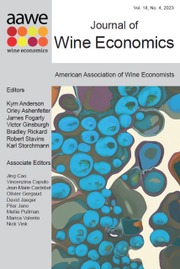Article contents
A Barrel of Oil or a Bottle of Wine: How Do Global Growth Dynamics Affect Commodity Prices?*
Published online by Cambridge University Press: 27 March 2014
Abstract
This paper explores empirically the causes of extreme fluctuations in commodity prices from January 1990 to June 2010 and seeks to identify the relative contribution of advanced and emerging market economies to the changes in commodity prices. Our assumption is that analyzing two very distinct goods—crude oil and fine wine—helps to identify common determinants of commodity prices. We find that the growth rate of global aggregate demand is the key macroeconomic determinant of the fluctuations in both crude oil and fine wine prices over the sample period. While advanced economies account for more than half of global consumption, emerging market and developing economies make up the bulk of the incremental change in demand, thereby having a greater weight in commodity price formation. The coefficient of emerging market industrial output growth is about three times as high as that of advanced economies in oil price regressions and almost five times as powerful in fine wine price regressions. The results also show that the shift in the composition of aggregate commodity demand is a recent phenomenon. (JEL Classifications: Q11, Q39, Q41, Q43)
- Type
- Articles
- Information
- Copyright
- Copyright © American Association of Wine Economists 2014
Footnotes
We thank, without implication, Paul Cashin, Joshua Charap, Reda Cherif, Harry de Gorter, Katerina Kalcheva, Lutz Kilian, Joannes Mongardini, David Robinson, Abdelhak Senhadji, Karl Storchmann, Fatih Yilmaz, and participants at the G-20 Workshop on Commodities in Buenos Aires, Argentina, and at the Inflation Risk Conference organized by the Toulouse School of Economics, Paris, France, for their insightful comments and suggestions. We are also grateful for the cooperation of Liv-ex Fine Wine Exchange. The views expressed herein are those of the authors and should not be attributed to the IMF, its Executive Board, or its management.
References
- 19
- Cited by


